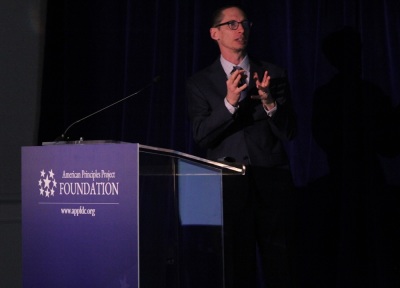Nearly 1 in 4 GOP midterm voters 'leaning against' voting for Trump in 2020, poll finds
37 percent of Americans think marriage is 'outdated' or are 'not sure'

WASHINGTON — Nearly one-quarter of Americans who voted for Republican candidates for Congress in the 2018 midterms say they are “definitely not” or “leaning against” voting for President Donald Trump in the 2020 presidential elections, a soon-to-be-released poll has found.
Speaking at a lunch event in the build-up to the the American Principles Project Foundation’s fifth-annual Red White and Blue Gala dinner at the historic Mayflower Hotel last week, University of Texas at Austin sociology professor and author Mark Regnerus presented data from an extensive post-midterm survey that sought to examine the impact that family structures had on the 2018 midterm elections.

The survey, which was conducted for the Austin Institute for the Study of Family and Culture, is based on a nationally representative sample of 5,285 Americans who were questioned just following the Nov. 8 election.
“We went into the field a couple days after the election and pulled out of the field may be a week-and-a-half later,” Regnerus told donors and other supporters in attendance for the event hosted by the socially conservative think tank. “Got this data last week. I am showing you what very few people have seen.”
According to Regnerus, the survey found that married Americans carried the “bulk of the weight” of the GOP House vote in the 2018 midterm while just 27 percent of respondents who have never been married and 27 percent of cohabitors voted for Republicans in the 2018 House vote.
The survey also found that 79 percent of married Americans said they definitely plan to vote in the 2020 presidential election, which would become their highest turnout rate, Regnerus said. He added that turnout records were also set for married Americans in 2014 and 2018.
Also among the findings, 84 percent of respondents who said they voted for President Donald Trump in the 2016 election said they again intend to back him in the 2020 presidential election.
Meanwhile, 13 percent of respondents who said they voted for a Republican for the House of Representatives in 2018 “are definitely not” going to vote for Trump in 2020. Additionally, 10 percent of respondents who voted for Republican for Congress in 2018 said they were “leaning against” voting for Trump in 2020.
“If you put that if you put that together, that is almost a quarter of GOP voters who said: ‘I don’t know about this president for next time,’” Regnerus explained, disclosing that results could be different once there is a better picture of who the Democratic candidate will be in 2020. “Only 53 percent of GOP midterm voters said they are definitely voting for the president in 2020.”
Additionally, over half of Trump’s 2016 voters who voted for Democrats for House of Representatives in 2018 say they are “leaning against” voting for Trump in 2020.
The survey also found that only 2.3 percent of respondents who voted for Hillary Clinton in 2016 said they plan to vote for Trump in 2020.
“I am not going to lean too heavily into this stuff because there is no Democratic candidate yet and until you have one, you are kind of asking questions into the dark: ‘what do you think about the current president?’” Regnerus said.
The survey also asked respondents whether or not they think marriage is “outdated as an institution.”
In 2014, only 9 percent of the American public agreed in some form that marriage is outdated while another 23 percent said they were “not sure.” But in 2018, 12 percent of respondents said that marriage was outdated and 25 percent said they weren’t sure.
“So, this is 37 percent of the public thinks marriage is outdated or they are not sure,” Regnerus relayed. “In the midterms, these two packs hung together. None of them supported their House GOP candidate at a rate above 22 percent. That is dramatic.”
“Americans who said marriage is definitely not outdated voted Republican at 58 percent,” he added. “Among the white subsample of those who said marriage is definitely not outdated, 70 percent voted Republican.”
According to Regnerus, there are several influential factors that indicate whether a person thinks marriage is outdated.
“If they think extramarital sex can sometimes be permitted, … if they think pornography is OK, if they think adolescent transgender transitions are OK. … People who think these are OK are more likely to think marriage is outdated,” he added.
“Only 31 percent of young men [20 to 24] and 48 percent of women strongly disagree with the statement marriage is outdated,” he added. “So, a good share of women still think it is good and fewer men think it is good.”
Regnerus explained that nonwhites are more likely to think of marriage as outdated, as well as unhappy and pro-choice people.
“These are the things that coalesce and press people towards wondering whether marriage is here for the long run,” he added.
Regnerus stated that 40 percent of people who “strongly agreed” that marriage is not outdated said they are not intending to vote for Trump in 2020, even though many of them voted for Republicans in their House races in 2018.
“It was a good predictor of how they voted in the midterms but it is not a good predictor of how they think in 2020,” Regnerus said. “It is linear but it is not super strong. It doesn’t mean that there are not a fair number of people who are not crazy about our current president.”
One new question that was asked in the poll this year that wasn’t asked in 2014 was a question of whether or not the respondents felt “secure” on a 1-to-4 scale.
The poll found that Americans who said they felt “very secure” were 2.4 times more likely as people who said they felt “very vulnerable” to have voted for a Republican in their house race.
“When we look at security by marital status though, married respondents [are] most secure,” Regnerus said. “They are also the most healthy. They are also the happiest and they are also the most likely to vote. Marriage pays these benefits independently.”
The survey also asked respondents whether they support “free markets.”
“Almost 90 percent of people who are most in support of free markets voted for the GOP House candidate in an election that didn’t go well,” Regnerus said. “What that tells you is a fair amount of Americans — since Republicans largely didn’t fare well — are trending away from support for free markets.”
He added that liberal Americans are “significantly more antagonistic” toward free markets in 2018 than they were in 2014.
Although there are many issues that divide Americans politically, Regnerus said that the new data indicates that views about polyamorous relationships and hormonal and surgical transitions for transgender adolescents are two of the best “predictors of polarization.”
Regnerus concluded by stating that “marriage is a package deal.”
“It provides security for people. They are less likely to feel vulnerable. It is a context for stable reproduction, sociability, employment, conservatism in public and private matters and aversion of external threats. By that, I do not mean Russia and China or anything like that but an aversion to external threats to the family,” he said.
“The one thing I conclude is that these things all matter independently of each other but they coalesce around the same kinds of people and it is not enough to just support free markets and think I am going to be free market on all these things — free market on issues of sexuality and marriage and free market on economy. You can’t be agnostic on marriage and family without undermining the idea of how we support a free market and how we get there. The kind of building blocks to a healthy economy and a healthy society is through the family and through marriage. We can see it in this data. We saw it in 2014.”
As an associate professor of sociology, Regnerus' interests are in sexual behavior, family, marriage and religion. He is also a senior fellow at the Austin Institute for the Study of Family and Culture. He has authored three books from Oxford University Press, including the 2017 title Cheap Sex: The Transformation of Men, Marriage, and Monogamy.
Follow Samuel Smith on Twitter: @IamSamSmith
or Facebook: SamuelSmithCP
d


























